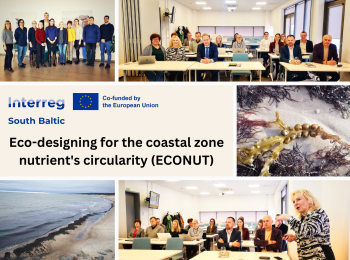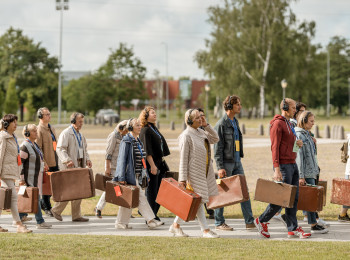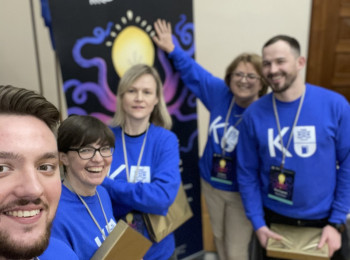The training program was oriented to those who aware in district heating system problems and its solutions. Therefore the event attracted great interest not only from heat supply companies, but also from other stakeholders, academic society and public.
The training program was focused on the pipelines lifetime, water preparation, leak detection technologies, accident prevention, DH management and digitization topics. Experience in these topics shared 17 experts from 6 countries: Austria, Denmark, Poland, Lithuania, Finland and Sweden.
Anna Karlsson from Kalmar Energi (Sweden) started the course with the introduction to the local energy system. During the pipelines lifetime topic session, Vytautas Dziuve from Vilnius district heating company presented the major factors that can influence the pipelines lifetime. The audience had a possibility to increase their knowledge related with existing methodologies of Vilnius District Heating Company as well as to find out about perspective company projects. Alberto Vega from RISE Research Institutes of Sweden presented effects of mechanical loads on the thermal ageing of district heating pipes. Scientist introduced different parameters that can affect the lifetime of district heating pipes during service time. Prof. Jolanta Januteniene from Klaipeda University presented statistics on the real lifetime of DH tubes, the results of experimental investigations of long-term operation of pipeline. Sabina Szmigielska from OPEC (Poland) shared the knowledge about the real lifetime of pre-insulated DH tubes in Poland and the factors affecting it. Andreas Martsman from PPR AB (Sweden) presented basic understanding of possibilities with relining of district heating pipes. He highlighted what type of pipes can be relined and the benefits with relining vs excavation as also important nowadays much lower carbon footprint. Paavo Persaud from Arne Jensen AB (Sweden) shared better understanding of preventive and predictive maintenance while finding weak pipes before rupture and accident. Christian Engel from Austroflex (Austria) gave the overview of typical plastic tubes for DH as well as shared understanding the technical application possibilities and limitations. He provided plastic pipes’s effect greenhouse gas reduction calculated by CO2 equivalent. Richard Bremer from QTF (Sweden) increased the awareness of gases influence on system fluids, the development of DH4, why it will encounter the same problems as commercial estates and what should be done. Magnus Ohlsson from Oresundskraft (Sweden) showed some example of different kind of status assessment as well as practical example of what a repair on concrete in DH looks like. Patrik Stensbo from Termisk Systemteknik (Sweden) showed 10 steps of aerial thermography application in DH. Maria Kalli from Vexve (Finland) shared new technology new iSENSE product family for pulse measurement in leak detection of district heating and cooling pipes. Moa Dahlman together with Rouven Voss from CFO Energy Opticon (Sweden) shared with the audience digital solutions for economic optimization of energy production. Christian Johansson from NODA (Sweden) gave the understanding the value of transforming energy data into information that can be used to maximize business impact. Steen Schelle Jensen from Kamstrup A/S (Denmark) demonstrated how data from existing smart meters can create date driven tools and solution for optimizing operation and maintenance of DHC networks. Maria Kalli from Vexve (Finland) presented new underground technologies as iSENSE product family which supports energy utilities in network optimization.
During the discussion and final inputs Hakan Knutsson from SweHeat&Coolling (Sweden) reviewed the course topics. He summarized the important points of our countries to reach more than 50% for DH market share, future proofing aging DH systems which enable its conversion – decarbonization. Valdas Lukosevicius from Lithuanian district heating association (LDHA) reflected about the importance of the topics presented. He highlighted that recently Lithuania starting to prepare new decade investment program where 3 priorities are taking into account as renewable energy expansion, energy efficiency and digitalization. BSAM project leader prof. William Hogland from Linnaeus University in Sweden and Klaipeda University team project manager prof. Olga Anne added comments on reducing carbon footprint in the DH system and local heating networks energy efficiency as well as optimization of parameters using the experience of the northern neighbors.
The aim of the project is to analyse the current situation and develop a Smart Asset Management model of district heating network in the Baltic Sea region based on the possibilities of international cooperation and transfer of knowledge.
More information and documents related to the Interreg V-A South Baltic Cross-Border Cooperation Program 2014-2020 can be found at www.southbaltic.eu and project information at www.lnu.se/en/bsam
The training course was organized in the framework of the international project BSAM - Baltic Smart Asset Management, funded by the European Regional Development Fund under the 2014-2020 Interreg South Baltic Cross-Border Cooperation Program.
 |






